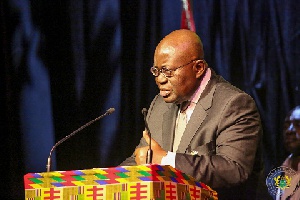 President Akufo-Addo addressing the Ghanaian community in Belgium
President Akufo-Addo addressing the Ghanaian community in Belgium
The President of the Republic, Nana Addo Dankwa Akufo-Addo, has stated that education and skills training are the most important source of empowering and providing opportunities to the youth to help drive Ghana’s development, and in the process create jobs.
According to him, the countries that have done well, even without natural resources, are the countries that have invested in education and skills training, and it is for this reason that his government has found and committed resources to begin the Free Senior High School policy in September 2017.
“So as from September this year, anybody entering the public Senior High School system is going to get their education free. The burden is being taken on by the State. We are doing so because we believe that having access to education, empowering our human capital, is our biggest challenge,” he said.
The President continued, “If we are able to do that, within the shortest possible time, and expose our young people to education, especially to new digital technology, it becomes the fastest way to bridge the gap and pull ourselves out from the poverty in which we are in today.”
President Akufo-Addo reiterated that “the commitment for Free SHS was not a political gimmick. I kept saying it in my campaign, but my opponents will not agree with me. It was not a political gimmick. It is a development tool for our country so that we put the country onto the path of progress and prosperity.”
The President made this known on Tuesday, June 6, 2017, when he addressed the Ghanaian community resident in Belgium, as part of his visit to that country, ahead of the conduct of the meetings of the United Nation’s Sustainable Development Goals Advocates Group of Eminent Personalities.
Revival of NHIS
On the revival of the National Health Insurance Scheme, President Akufo-Addo noted that his government has found it necessary to find the money to save the scheme off collapse.
“The scheme has been threatened by mismanagement and by huge indebtedness. We are now having to liquidate systematically the arrears so that the service providers can be encouraged to provide services for NHIS card holders. I am hoping that within 18 months, all the arrears of the NHIS would have been settled so that we can have a secure future for the scheme,” he said.
Fight against galamsey
Touching on the fight against galamsey, President Akufo-Addo acknowledged that Ghana, for many centuries, has been a country of mineral deposits and the exploitation of minerals.
“We are not trying to ban mining in Ghana. We cannot do that. The mineral deposits in our country are part of our heritage, and are meant to be exploited for the benefit of this and future generations,” he said.
What his government will not allow, however, the President indicated, “is to allow the mining to compromise the future of our country, compromise our environment and destroy and pollute our water bodies. We cannot do that. If we do that, we will wake up tomorrow with no country to live in. I am not going to be part of any such arrangement.”
He continued, “So, we have identified illegal small-scale mining as the target for the fight against galamsey. We want to make sure that not only do we stop it, but the people who are involved in it find alternative employment.”
With the Minister for Environment, Science, Technology and Innovation, Prof. Frimpong Boateng, heading a Cabinet Committee which is identifying alternative sources of livelihood for persons involved in illegal mining activities, President Akufo-Addo noted that the proposals which are in the pipeline include using “galamseyers” to reclaim the lands, as well as offering them incentives to go into farming.
“Having begun it, we are not turning back until we make sure that our future is protected,” he stressed.